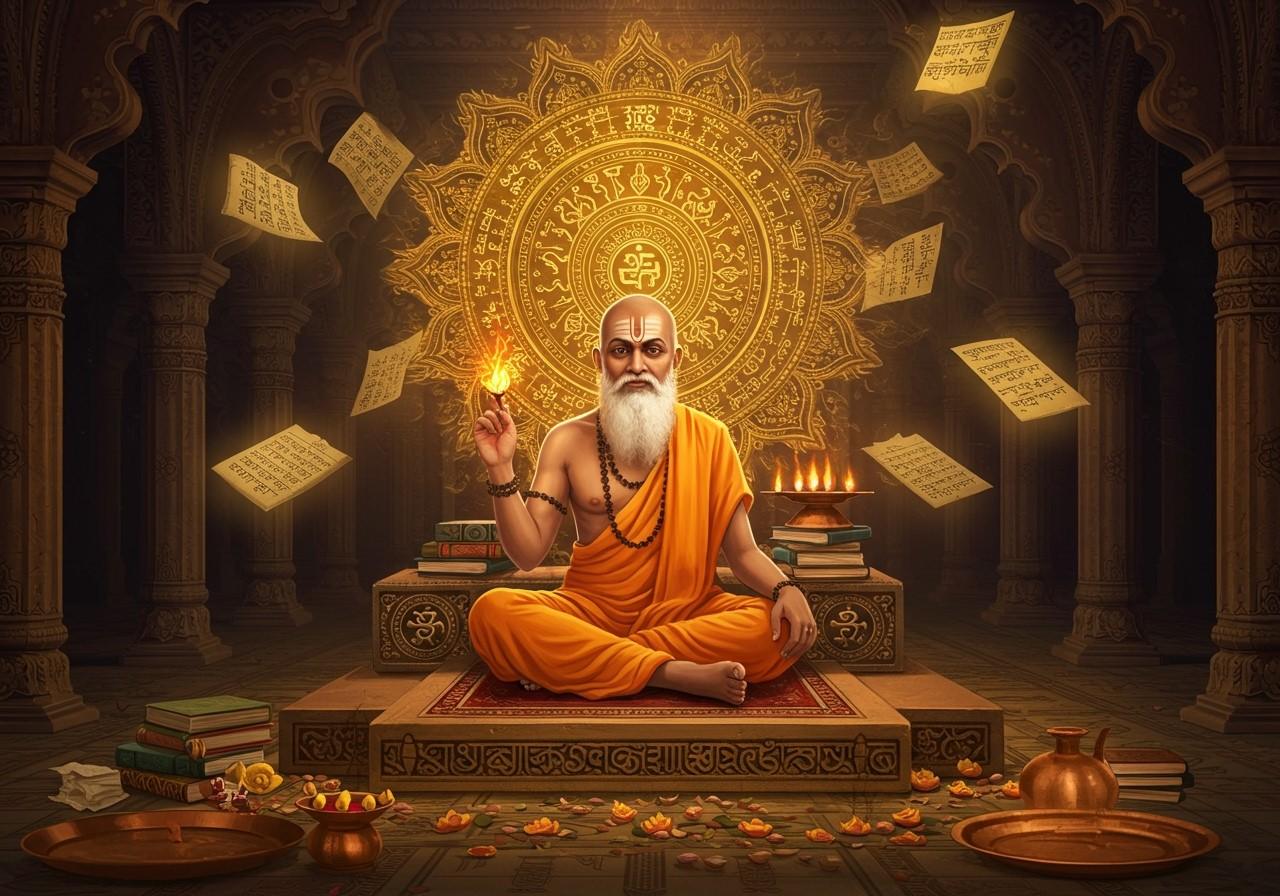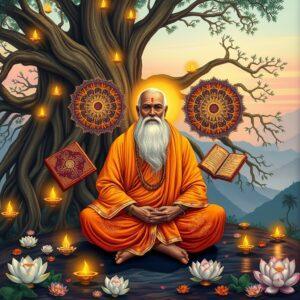
Kumārila Bhaṭṭa, a prominent scholar and philosopher of ancient India (early 8th century CE), significantly shaped the Mīmāṃsā school of philosophy. His writings provide a crucial framework for understanding Vedic rituals and their importance within Indian traditions. This article delves into the life, philosophy, and enduring legacy of Kumārila Bhaṭṭa, emphasizing his contributions to Indian thought and culture.
Who was Kumārila Bhaṭṭa?
Kumārila Bhaṭṭa was a renowned Indian philosopher and a leading advocate for the Mīmāṃsā school of philosophy. His teachings, originating in the early 8th century CE, profoundly impacted various aspects of Hindu rituals and practices. He is celebrated for his comprehensive commentaries on the Vedas, especially the Purva Mīmāṃsā Sutras. His vigorous debates with Buddhist scholars, notably Dharmakirti, highlight his role in defending Vedic traditions against Buddhist critiques. Kumārila Bhaṭṭa’s life was dedicated to preserving Vedic knowledge and the integrity of its rituals.
Kumārila Bhaṭṭa’s Philosophical Contributions
Kumārila Bhaṭṭa’s philosophical work centers on the Mīmāṃsā school. He stressed the significance of ritual actions as prescribed in the Vedas, asserting their eternal and authoritative nature. He argued that these rituals, when performed correctly, maintain cosmic order. His epistemological views validate pratyaksha (perception) and anumana (inference) as legitimate means of acquiring knowledge. He introduced the concept of svatah pramanya (self-evidence of knowledge) and challenged Buddhist doctrines like momentariness and anatman (non-self). His exploration of language and meaning, particularly in Vakyabheda, underscores the crucial role of linguistic interpretation in understanding Vedic texts.
Mimamsa philosophy, as championed by Kumārila Bhaṭṭa, is a school of Hindu thought that emphasizes the interpretation and application of the Vedas. It focuses on ritual practices, dharma (duty), karma (action and consequence), and moksha (liberation). As one of the six orthodox systems of Indian philosophy, it has two main branches: Purva Mimamsa (dealing with the early Vedic sections) and Karma Mimamsa (exploring rituals and their meanings). Mimamsa provides specific rules for interpreting the Vedas and has significantly influenced Hindu law and Vedanta.
Kumārila Bhaṭṭa’s Key Works
Kumārila Bhaṭṭa authored several important texts that are fundamental to Mīmāṃsā philosophy. These include:
- Tantravarttika: A meticulous examination of the ritualistic aspects of the Vedas, delving into the intricacies of their performance and significance.
- Shlokavarttika: A comprehensive critique of Buddhist philosophy, addressing key points of contention between the two schools of thought.
- Tuptika: A discussion of Mīmāṃsā principles in relation to other philosophical traditions, providing a comparative perspective on its core tenets.
These works grapple with complex philosophical questions concerning the nature of dharma (duty), the interpretation of Vedic injunctions, and the validity of different methods of knowledge acquisition.
Enduring Influence and Legacy
Kumārila Bhaṭṭa’s contributions have had a profound and lasting effect on Indian philosophy and religious practices. His defense of Vedic rituals played a critical role in preserving traditional Hindu practices against the growing influence of Buddhism in medieval India. His teachings influenced subsequent philosophers, including Adi Shankaracharya, who integrated Mīmāṃsā principles into Advaita Vedanta. Kumārila Bhaṭṭa’s works remain subjects of study and reverence among scholars of Indian philosophy. The Mīmāṃsā school, as shaped by him, continues to be a vital component of Hindu theological discourse, emphasizing the importance of ritual and the authority of the Vedas.
How Poojn.in Supports Your Spiritual Journey
Kumārila Bhaṭṭa’s teachings highlight the importance of proper Vedic rituals and their correct execution. At Poojn.in, India’s largest online store for spiritual and puja items, we offer authentic products that align with these traditional Vedic practices. We are committed to providing high-quality items that support your spiritual journey.
For those studying or practicing Kumārila Bhaṭṭa’s Mīmāṃsā philosophy, we offer a wide selection of products, including:
- Pure copper and brass items for ritual performances: We offer a wide variety of kalash, diyas, and other ritual items crafted from pure copper and brass, essential for performing Vedic rituals as described in texts like Tantravarttika. Explore our collection.
- Traditional dhoop and agarbatti for sacred ceremonies: Enhance your ceremonies with the fragrant offerings of traditional dhoop and agarbatti, creating a sacred atmosphere conducive to spiritual practice. Discover our range of incense.
- Authentic kumkum and other ritual powders: Our selection of authentic kumkum and other ritual powders ensures the purity and sanctity of your rituals, upholding the traditions emphasized by Kumārila Bhaṭṭa. Browse our selection here.
Visit www.poojn.in to explore our complete range of puja samagri. We deliver across India, bringing authentic ritual items directly to your doorstep. Our customer service team is available to assist you in selecting the right items for your spiritual practices.
Conclusion
Kumārila Bhaṭṭa’s life and philosophy have left an enduring legacy on Indian thought and religious practices. His steadfast commitment to the Vedas and his rigorous defense of ritualistic traditions established the Mīmāṃsā school as a cornerstone of Hindu philosophy. His works, such as Tantravarttika, Shlokavarttika, and Tuptika, remain essential resources for understanding Vedic rituals and the philosophical debates surrounding them. Through his influential teachings, Kumārila Bhaṭṭa ensured the preservation of Vedic knowledge, providing profound insights into the role of rituals in maintaining cosmic order. His legacy continues to inspire scholars and practitioners seeking to understand and uphold the rich traditions of Hinduism. Kumārila Bhaṭṭa remains a revered figure whose contributions enrich our spiritual and philosophical heritage.
Frequently Asked Questions about Kumārila Bhaṭṭa
What distinguished Kumārila Bhaṭṭa’s philosophical approach? Kumārila Bhaṭṭa’s philosophy focused on interpreting Vedic texts and rituals. He believed in the eternal and infallible nature of the Vedas and stressed the importance of performing rituals correctly, as outlined in his works like Tantravarttika (exploring Vedic rituals) and Shlokavarttika (critiquing Buddhist philosophy). He significantly influenced Hindu philosophy by defending the authority of the Vedas and preserving the tradition of Vedic rituals, shaping the Mīmāṃsā school into a cornerstone of Hindu thought. You can explore his works further and delve into scholarly articles and books to learn more about his philosophy and contributions. Some of his notable students, like Prabhakara, continued his work within the Mīmāṃsā school, further solidifying his impact on Indian thought.
How does Mīmāṃsā philosophy relate to Hinduism? Mīmāṃsā is a school of Hindu thought that emphasizes interpreting the Vedas and performing rituals. It stresses dharma (duty), karma, and moksha. As one of six orthodox Hindu philosophies, it has two branches: Purva Mimamsa (early Vedic sections) and Karma Mimamsa (rituals and their meanings). Mīmāṃsā’s rules for interpreting the Vedas have influenced Hindu law and Vedanta. For further exploration, consider resources like Hinduism’s Global Reach and Hinduism: A Complete History and Origin.


